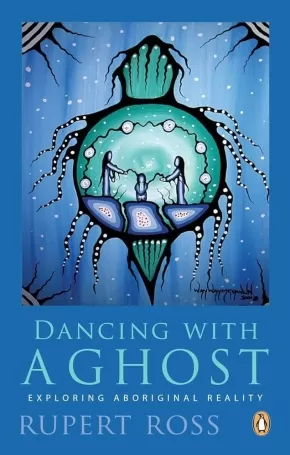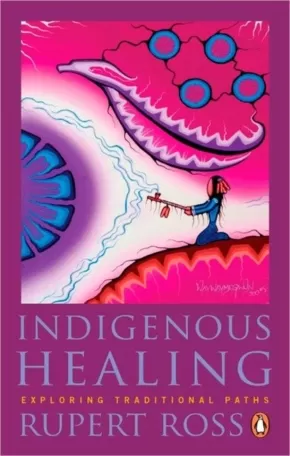Rupert Ross
Rupert Ross is a retired assistant Crown Attorney for the District of Kenora, Ontario. Starting in 1985, he conducted criminal prosecutions for more than twenty remote Ojibway and Cree First Nations communities in northwestern Ontario.
His first book, Dancing with a Ghost, started his exploration of Indigenous visions of existence and became a bestseller. His second book, Returning to the Teachings, was also a bestseller and examined the Indigenous preference for the “peacemaker justice” he observed during a three-year secondment with Justice Canada.
Both books were shortlisted for the Gordon Montour Award for the best Canadian non-fiction book on social issues, and are presently used in universities and colleges across North America. Following his retirement, Ross was awarded the prestigious 2011 National Prosecution Award for Humanitarianism, and the Ontario Crown Attorneys Association has created an award named after him. He continues to live just north of Kenora with his wife, Val.
Books (3)
Synopsis:
As a Crown Attorney working with First Nations in remote northwestern Ontario, Rupert Ross learned that he was routinely misinterpreting the behaviour of Aboriginal victims, witnesses, and offenders, both in and out of court. He discovered that he regularly drew wrong conclusions when he encountered witnesses who wouldn’t make eye contact, victims who wouldn’t testify in the presence of the accused, and parents who showed great reluctance to interfere in their children’s offending behaviour. With the assistance of Aboriginal teachers, he began to see that behind such behaviour lay a complex web of coherent cultural commandments that he had never suspected, much less understood.
As his awareness of traditional Native teachings grew, he found that the areas of miscommunication extended well beyond the courtroom, causing cross-cultural misunderstanding—and ill-informed condemnation.
Dancing with a Ghost is Ross’s attempt to give some definition to the cultural gap that bedevils the relationships and distorts the communications between Native peoples and the dominant white Canadian society—and to encourage others to begin their own respectful cross-cultural explorations. As Ross discovered, traditional perspectives have a great deal to offer modern-day Canada, not only in the context of justice but also in terms of the broader concepts of peaceful social organization and personal fulfilment.
Additional Information
|
Synopsis:
Imagine a world in which people see themselves as embedded in the natural order, with ethical responsibilities not only toward each other, but also toward rocks, trees, water and all nature. Imagine seeing yourself not as a master of Creation, but as the most humble, dependent and vulnerable part.
Rupert Ross explores this indigenous world view and the determination of indigenous thinkers to restore it to full prominence today. He comes to understand that an appreciation of this perspective is vital to understanding the destructive forces of colonization. As a former Crown Attorney in northern Ontario, Ross witnessed many of these forces. He examines them here with a special focus on residential schools and their power to destabilize entire communities long after the last school has closed. With help from many indigenous authors, he explores their emerging conviction that healing is now better described as “decolonization therapy.” And the key to healing, they assert, is a return to the traditional indigenous world view.
The author of two previous bestsellers on indigenous themes, Dancing with a Ghost and Returning to the Teachings, Ross shares his continuing personal journey into traditional understanding with all of the confusion, delight and exhilaration of learning to see the world in a different way.
Ross sees the beginning of a vibrant future for indigenous people across Canada as they begin to restore their own definition of a “healthy person” and bring that indigenous wellness into being once again. Indigenous Healing is a hopeful book, not only for indigenous people, but for all others open to accepting some of their ancient lessons about who we might choose to be.
Additional Information
344 pages | 5.25" x 8.20" | Paperback
Synopsis:
In his bestselling book Dancing with a Ghost, Rupert Ross began his exploration of Aboriginal approaches to justice and the visions of life that shape them. Returning to the Teachings takes this exploration further still.
During a three-year secondment with Justice Canada, Ross travelled from the Yukon to Cape Breton Island, examining”and experiencing”the widespread Aboriginal preference for peacemaker justice. In this remarkable book, he invites us to accompany him as he moves past the pain and suffering that grip so many communities and into the exceptional promise of individual, family and community healing that traditional teachings are now restoring to Aboriginal Canada. He shares his confusion, frustrations and delights as Elders and other teachers guide him, in their unique and often puzzling ways, into ancient visions of Creation and our role with it.
Returning to the Teachings is about Aboriginal justice and much more, speaking not only to our minds, but also to our hearts and spirits. Above all, it stands as a search for the values and visions that give life its significance and that any justice system, Aboriginal or otherwise, must serve and respect.








